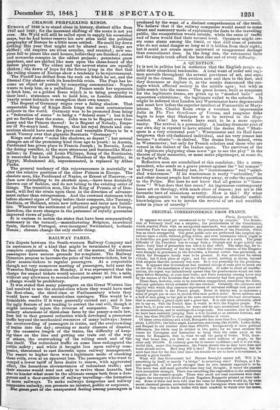CHANGE PERPLEXING KINGS.
EUROPE of 1848 is to stand alone in history, distinct alike from 1847 and 1849 ; for the incessant shifting of the scene is not yet over. Mr. Wyld will still be called upon to supply his occasional maps, but he had better reserve his new atlas until the political geography of Europe be a little more settled. He could lay down nothing this year that might not be altered next. Kings are shifted ; old empires are riven asunder, and reunited ; new em- pires fall to pieces like card houses, before they are finished ; states and monarchs conspire in the oddest projects ; potentates grow impotent, and are shifted like men upon the chess-board of the fastest players. The oldest and the newest states are equally shaken ; the dawn of hope for the future lying in the fact that the ruling classes of Europe show a tendency to be rejuvenescent.
The Pontiff has drifted from the rock on which he sat, and the Eternal City shakes with its hundredth crisis. The Pope has be- come an object of pursuit by competing communities : Naples wants to keep him, as a palladium ; France sends her argonauts to fetch him, as a golden fleece which is to bring prosperity to their land ; statesmen seek to hold him, as London Aldermen yearly count hobnails to strengthen their own tenure. The Regent of Germany reigns over a fading shadow. That respectable King of Kings finds kings the most contumacious subjects in the world. Germany was to be promoted from being a "federation of states" to being a "federal state " ; but it has got no further than the name. John was to be Regent over Ger- many and the Princes thereof: he is Regent of Nobody, Empe- ror of No-man's land. Strange, that his royal friends and con- nexions should have sent the grave and venerable Prince to be a mock Viceroy over that gigantic Barataria " Germany " I Kings and states " come like shadows, so depart "; but several changes are of the promising kind from age to youth : in Austria, Ferdinand has given place to Francis Joseph ; in Bavaria, Louis the doting versifier, to the more strenuous and businesslike Maxi- milian; in France, old Louis Philippe, King of the Barricades, is succeeded by Louis Napoleon, President of the Republic; in Egypt, Mohammed Ali, superannuated, is replaced by Abbas Pacha.
The general tendency of this rejuvenescence is materially to alter the relative positions of the other Princes in Europe. The obsolete men, like Ferdinand of Naples, or Ernest of Hanover,—a class now dwindling to its shortest span,—have been decidedly thrown out of fashion, and do not belong to the existing order of things. The transition men, like the King of Prussia or of Den- mark, will feel the strain upon them in the direction of advance- ment rather than retrogression. And the crowned statesmen who before showed signs of being before their compeers, like Tuscany, Sardinia, or Holland, attain new influences and incur new liabili- ties. Whatever the settlement of political geography in Europe, therefore, the mere changes in the personnel of royalty guarantee improved views of policy.
It is curious to notice the states that have been comparatively stationary in the turmoil,—manufacturing Belgium, anarchical Spain, factious Portugal, ever-insurgent Switzerland, barbaric Russia ; chronic change the only stable thing.


























 Previous page
Previous page